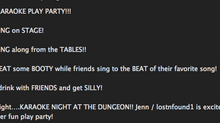Nerdy Karaoke!
- Jeffrey Bryan

- Mar 17, 2018
- 4 min read

While attending ICFA, my friend and fellow game scholar at UCF, Taylor Howard, organized a "Nerdy Karaoke" night, with my research in mind. What an incredible nice thing to do! Taylor studies video games, digital media, Writing Across the Curriculum, and critical theory. He believes that "games can be a particularly effective way to explore critical concepts, and hope to expand on the idea of "critical playing" as a mode of theoretical practice" and is a fantastic scholar.
Now, why the pedigree? Well, one, to show some respect to Taylor for organizing this nerdy karaoke, but two, to point out why this was a bit nerdier than the standard nerdy karaoke held at the Geek Easy in Winter Park, FL, a games enthusiast's bar connected to a games shop. That is to say, anything at the Geek Easy is nerdy, but this was academic nerdy— we gathered up ICFA attendees to come out for a night of drinking and singing, preferably in that order. Taylor billed it as "Nerdy Karaoke: ICFA Edition" and it did not disappoint.
As mentioned before, the Geek Easy is a games enthusiast's bar. It's connected to a comic book shop and fills its space with videogame and comic book references. There are silhouettes of Goku and Superman fighting, little super mario question block lamps, and TVs setup near the entrance hooked up to old consoles so you can really get your nostalgia on. They also have a number of great drinks with appropriately geeky names. All in all, it looks like your mom's basement, but better,
The karaoke itself was much like any other I've experienced except that the general singing quality was quite a bit poorer (though the ICFA folks did an awesome job!). I hesitate to suggest that this might mean nerds aren't great singers as theater nerds are fantastic singers, but who knows. Another difference was the song choices. This karaoke leaned toward rock music and pop hits that I've rarely heard at other locations. It certainly wasn't as though they had all dusted off the truly rare for their performances, but the songs were certainly more uncommon. Now this is Florida, not California, so we may see in this a reflection of location more than clientele. Regardless, it was all around a different experience yet still definitely a game of karaoke that wouldn't necessarily scream "variant" to any who went there for a standard game of karaoke.
There were two other things that caught my attention. First, the KJ did not have a song book. Instead, he had a website he would direct participants to. I've seen quite a few different ways to handle song lists, but this was new. Certainly many KJs have their song choices listed on their websites, but I've never seen one depend exclusively on their website for that element of the game. This made me wonder how KJs decide what to use for this service and why. To my knowledge, that has been no market research to validate which method achieves the best results. Some KJs, for instance, just use a book, especially those who use CDs as the book hold's the song's "location" which is used to identify the CD as well. Other KJs offer a book, but stay at their computer, available to do a quick resource scan within their karaoke software. And for each of these, the KJs tend to use either slips of paper for the player to write their choice on, or the KJ provides a clipboard with a signup sheet. Finally, others use a fully automated system that does all the work, giving players the ability to save their song choices via a login, while also allowing the player to search and select the music themselves, leaving the KJ free to focus on the singer and the crowd. So, how do they decide what to use? What are the benefits and pitfalls of each, and which to players prefer?
The second unique occurrence happened at the end of the evening, as we all began to make our way home. One of the players broke what I had assumed was an unwritten rule: you cannot sing your own song. And he did so without much consequence. See, karaoke sits on a performance spectrum— somewhere between professional musician performing their own work, and amateurs participating in a sing-a-long. Or more specifically, it sits between open mic night and sing-along. This player devised a new granularity for that scale, something that sits between karaoke and open mic: singing your own lyrics to someone else's song. And in keeping with the nerdy theme, the lyrics were about his time on an MMO, hanging out with his friends. So obviously this was fascinating, and awesome, but it had me wondering about karaoke rules. Just what are the rules of karaoke? Which ones are explicit? Which are implicit? Which are non-negotiable? Which can be negotiated? I sat and spoke with this player a bit and then he offered to give me the paper he wrote his lyrics on. They were simple lyrics with a simple theme; nothing special... and yet the novelty of his performance had the crowd truly cheering. Good stuff.
Thanks ICFA attendees for coming out, and a special thanks to Taylor Howard for organizing this wonderful event. Here's looking for to next year!













































Comments